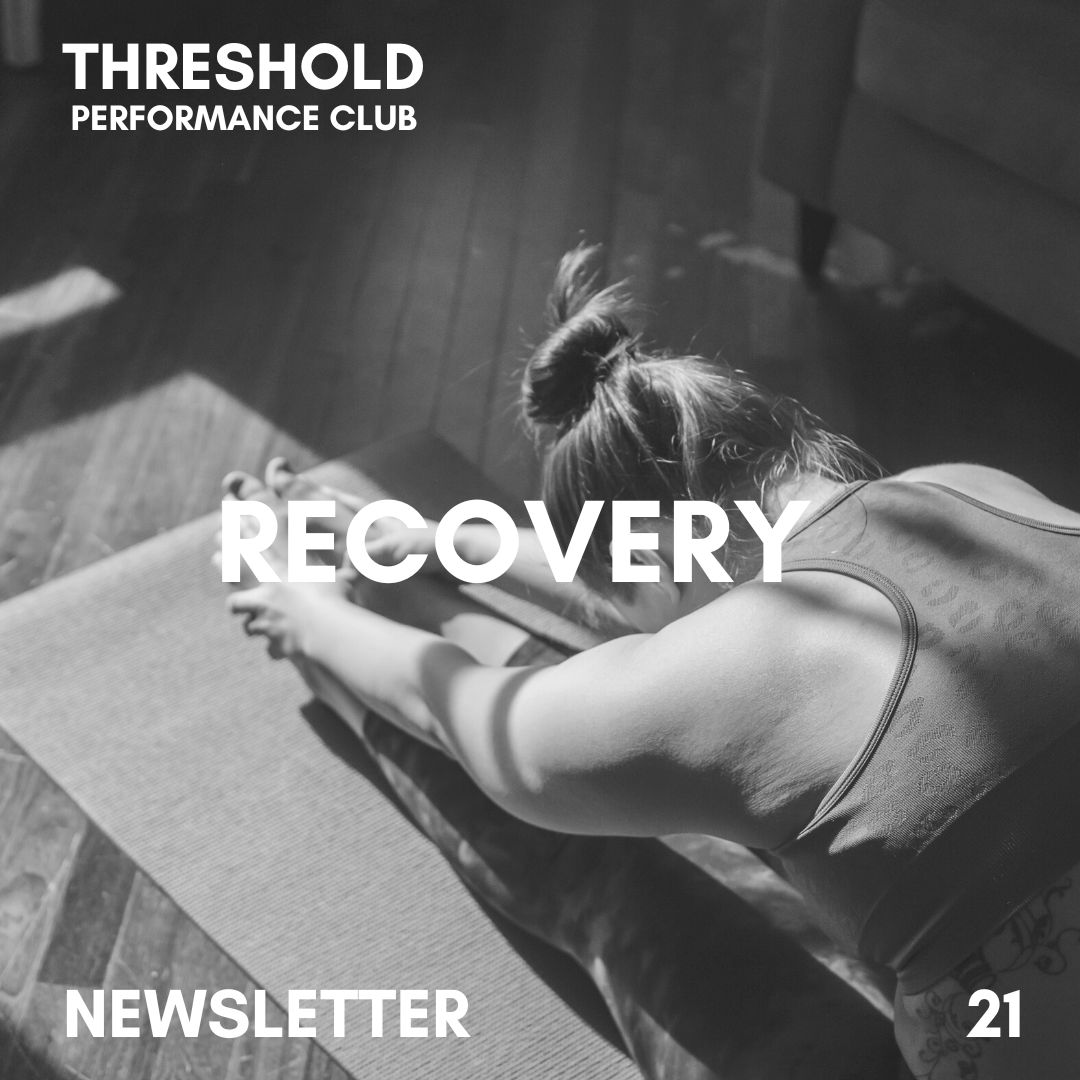Threshold #21 | Recovery is the secret to performance

I used to think the actual workout was 100% of the reason I would see performance gains.
Pushing myself an extra rep or set on a weight machine or running an additional km at a fast pace.
However...
Recovery is the secret to increasing the effectiveness of training.
So how can you enhance performance through recovery?
The Main Feature
Leg one: Recovery starts with the night before
Sleep is a crucial component of the recovery process for athletes, including runners, cyclists, swimmers, ‘crossfitters’ and every sport in between. During sleep, the body performs several important functions that aid in recovery and repair. Here are some reasons why sleeping is vital for recovery from intense training sessions:
Muscle repair: Physical activity, such as running and cycling, can cause microscopic damage to muscle fibers. During sleep, the body releases growth hormone, which stimulates the repair and regeneration of these damaged muscle fibers. Additionally, sleep is important for the synthesis of new proteins, which are necessary for muscle growth and repair.
Hormone regulation: Sleep plays a critical role in regulating the release of hormones that are essential for recovery and repair. For example, cortisol is a hormone that is released in response to stress, including exercise. However, prolonged elevation of cortisol levels can have negative effects on the body, such as increased inflammation and decreased muscle protein synthesis. Adequate sleep helps to regulate cortisol levels and other hormones, such as testosterone and insulin, which are essential for recovery and repair.
Energy restoration: During endurance exercise, such as running and cycling, the body relies on glycogen stores in the muscles and liver for energy. These stores become depleted during exercise, and must be replenished to support future workouts. Sleep is important for the restoration of glycogen stores in the muscles and liver, which can improve endurance performance.
Mental recovery: Sleep is also important for mental recovery, including the restoration of cognitive function and mood. Sleep deprivation can impair cognitive function, including attention, memory, and decision-making. Additionally, sleep deprivation can lead to negative changes in mood, including increased irritability and decreased motivation. Adequate sleep is important for mental recovery, which can improve performance and reduce the risk of injury.
In summary, sleep is essential for recovery from running and cycling because it promotes muscle repair, regulates hormones, restores energy levels, and facilitates mental recovery. These processes are critical for optimising performance and reducing the risk of injury in athletes.
T-1: Mental Preparation
Start the day writing down the following:
1) One thing you’re grateful for
2) One thing you’re going to achieve today
3) One thing you’re going to achieve in the next 3 months
Leg 2: Refuel to recover
Food and nutrition are crucial for recovery from training because they provide the body with the necessary nutrients and energy to repair and rebuild damaged tissues, replenish energy stores, and support optimal physiological function.
After exercise, the body requires protein to repair and rebuild damaged muscle tissue. Consuming protein after exercise can help to promote muscle repair and growth. Carbohydrates are also important for recovery, as they can replenish depleted glycogen stores, which are the primary source of energy for endurance exercise.
Exercise can also cause inflammation in the body, which can contribute to muscle soreness and fatigue. Consuming foods with anti-inflammatory properties, such as fruits, vegetables, and omega-3 fatty acids, can help to reduce inflammation and improve recovery.
Hydration is also essential for recovery, as exercise can lead to dehydration, which can impair physical and cognitive function. Consuming fluids and electrolytes after exercise can help to rehydrate the body and restore optimal physiological function.
Finally, vitamins and minerals are essential for optimal physiological function, and exercise can increase the body's demand for these nutrients. Consuming a varied diet rich in fruits, vegetables, whole grains, and lean protein can help to ensure adequate intake of these micronutrients, which can support recovery and performance.
In summary, a balanced diet that includes adequate protein, carbohydrates, fluids, and micronutrients is essential for recovery from training. Consuming the right foods at the right time can help athletes to optimize recovery, reduce the risk of injury, and improve performance.
T-2: Gear to change into
Shop natural supplements formulated to enhance performance:
🌱💊 542 Performance Nutrition Daily Green’s ultimate super greens capsules are a perfect blend of superfoods, vitamins, minerals and wholefood-sourced ingredients enhancing your immune system to help you perform in training.
🍄 542 Performance Nutrition Mushroom+ capsules are single-ingredient, high-strength mushroom supplements, helping you deliver energy to your body for training.
💪 542 Performance Nutrition Marine Collagen is the highest quality, and most bioavailable source of collagen available, helping to provide structural integrity to joints and bones.
💤 542 Performance Nutrition Ashwagandha+ (KSM66) is formulated with Cordyceps & Ginseng to help combat stress and adrenal fatigue, while also supporting the immune system, energy levels & mental performance.
🏋️♂️ 542 Performance Nutrition Plant Protein delivers 17g of premium vegan protein per serving with just 1.5g of carbs, 88 calories & no artificial sweeteners.
🏋️♂️ 542 Performance Nutrition Whey Protein delivers 22g of premium whey protein per serving with just 1.2g of carbs, 108 calories & no artificial sweeteners.
Leg 3: Use technology
For an endurance athlete competing in an Ironman race, glucose trackers like Supersapiens or Levels can be a valuable tool for optimizing performance and recovery. The CGM technology allows athletes to monitor blood glucose levels in real-time, providing valuable insights into fuelling strategies during the race. During the Ironman race, it is critical for athletes to maintain optimal blood glucose levels to support energy production and reduce the risk of hypoglycemia.
By monitoring blood glucose levels, athletes can determine when and how much carbohydrates they need to consume to maintain optimal performance during the race. For example, glucose levels typically decrease during long bouts of exercise, and athletes can use this information to adjust their carbohydrate intake and ensure they have enough fuel to complete the race. Glucose trackers like Supersapiens can also help athletes identify when to consume carbohydrates during the race and when to avoid over-consuming them, which can lead to gastrointestinal issues.
Additionally, glucose trackers can help athletes to identify potential areas of improvement in their nutrition, training, and recovery strategies. By analyzing glucose trends and responses to different foods, athletes can tailor their nutrition plans to support optimal performance and recovery during the Ironman race. They can also adjust their training and recovery strategies based on glucose data, helping them to optimize their performance and avoid overtraining or injury.
Furthermore, monitoring blood glucose levels during recovery can help athletes to determine when and how much carbohydrates they need to consume to support optimal recovery and prepare for the next day's events. Ironman races typically span multiple days, making recovery a critical component of performance. By monitoring blood glucose levels during recovery, athletes can adjust their nutrition plans and support optimal recovery to perform at their best in subsequent events.
Overall, glucose trackers like Supersapiens can be a powerful tool for endurance athletes competing in Ironman races. By providing real-time data on blood glucose levels, athletes can optimise their fuelling and recovery strategies, improve performance, and reduce the risk of health issues during the demanding race.
So that’s how you can recover and increase your performance.
Aid station: Listen as you recover
That Triathlon Show: Dustin Joubert, PhD & Dr. Amol Sanexa, DPM. Listen here.
Huberman Lab. Leverage Dopamine to Overcome Procrastination & Optimise Effort. Listen here.
Feel Better. Live More. The New Addition To My Morning Routine. Listen here.
Rich Roll. Unlocking the Science of Longevity with Peter Attia, MD. Listen here.
Coaches Corner
Recovery is the secret to better performance. Ensuring your body has recovered after each session ensures you’ll be well rested for the following day’s training. Compounding positive progress day after day.
WOTW: Workout of the week
Swim Leg Day
Warm up:
100m free
200m: 25 legs 2 beat kick. 25 4 beat kick. 50 free.
Main set:
5× 100m @ 100% pace with flippers
5× 100m @ 100% pace free
5× 100m @ 100% pace with flippers
Cool down:
100m free
Finishing line: Races next week
Tweet-athlon
MemeOTW

Thank you for reading this weeks newsletter.
You can keep up with us daily on Instagram here and follow my (Robert, triathlete - Ironman 70.3 athlete) Strava here.
Currently training for Ironman Staffordshire in June.
DM me on Instagram personally if you're London based - we're always out for group runners & rides. Connect here.

